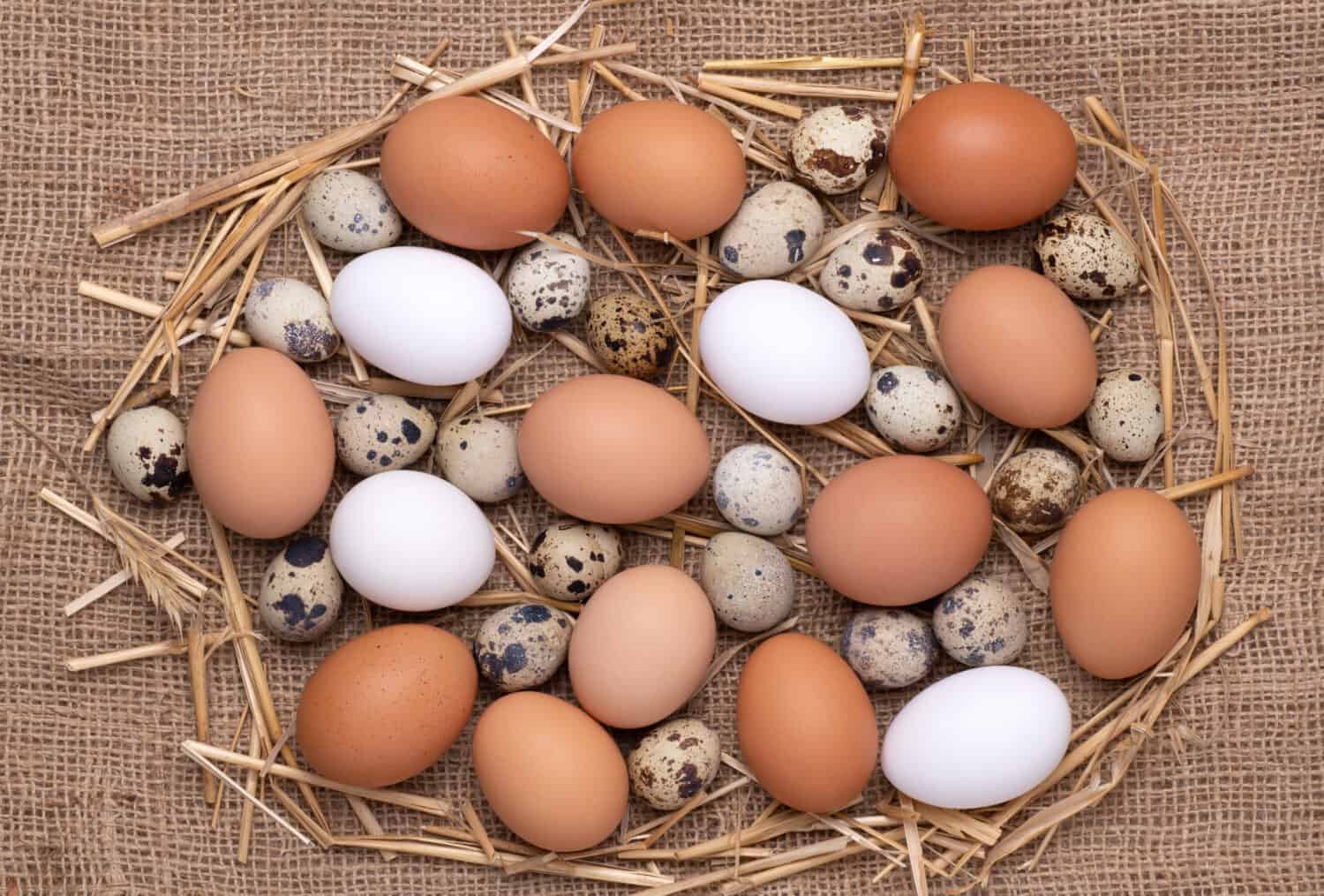When it comes to choosing eggs for your next recipe or breakfast meal, chicken eggs are probably what comes to your mind first. After all, they are the most popular and well-known type of egg! But have you ever heard of or considered using quail eggs?
These small and mighty eggs are becoming more and more popular in the kitchen. But what sets quail eggs apart from chicken eggs? For starters, quail eggs have an advantage when it comes to nutrition. Compared to chicken eggs, quail eggs contain more fat and protein, double the iron and riboflavin, and around a third more vitamin B12.
Several other things set these two types of eggs apart, too, including their size, appearance, common uses, and cost. So let's jump into the compelling world of quail eggs versus chicken eggs and discover the perfect fit for your next family meal.
Quail Eggs vs. Chicken Eggs: What are the Differences?
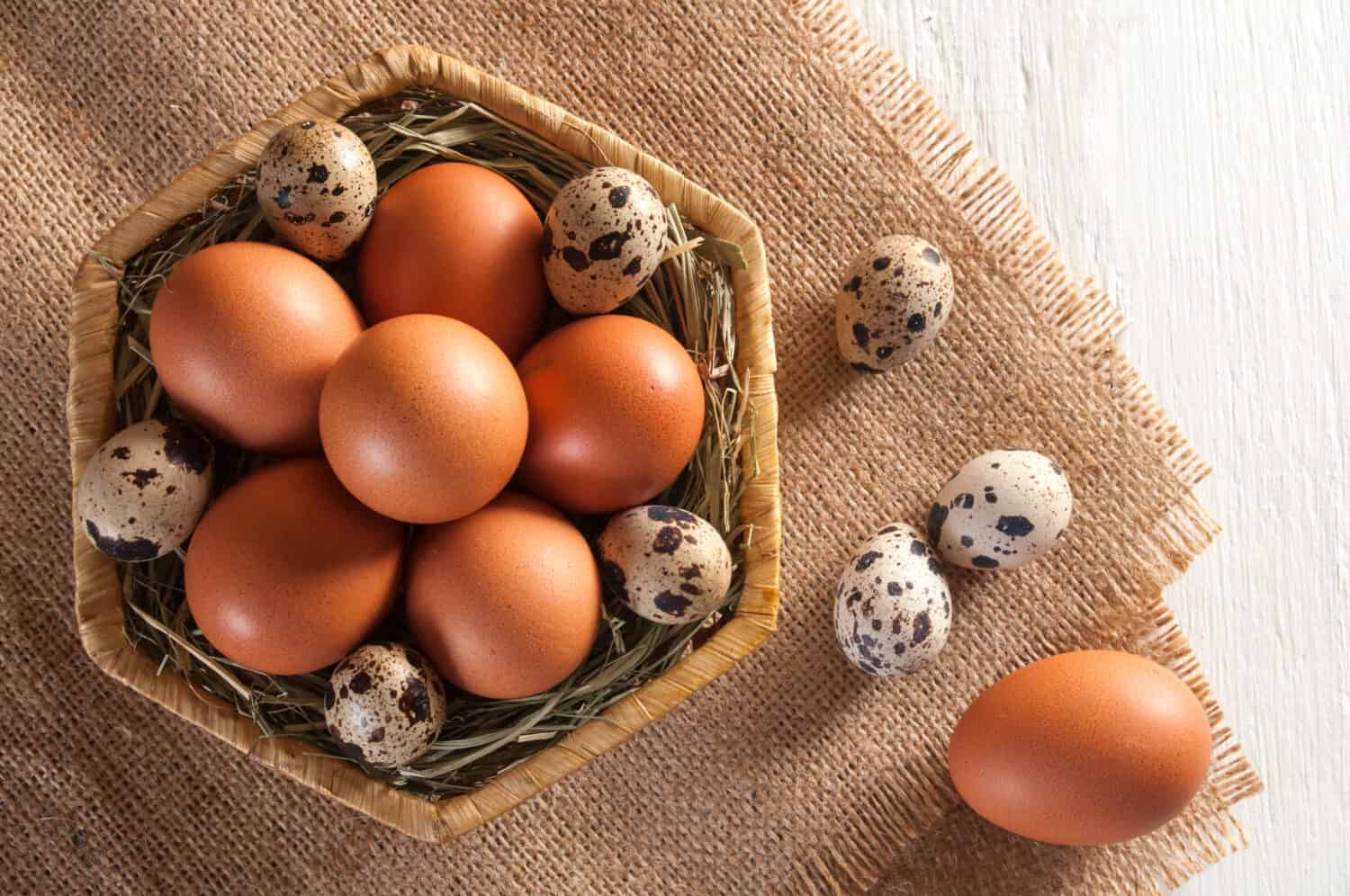
Quail eggs are much smaller than chicken eggs and often have a speckled shell.
©Aleshin_Aleksei/Shutterstock.com
As mentioned, quail eggs pack a punch nutritionally, setting them apart from chicken eggs. But quail eggs are also smaller in size and often have speckled shells. Let's take a closer look at the differences between these two tasty and versatile eggs.
- The must-have convenient reference guide for every home cook!
- Includes more than 8,000 substitutions for ingredients, cookware, and techniques.
- Save time and money on by avoiding trips to grab that "missing" ingredient you don't really need.
Size and Appearance
Quail eggs are petite, about one-fourth to one-third the size of a chicken egg. They also have a speckled shell with various colors, such as brown, white, or blue. Their delicate and cute appearance is often considered aesthetically appealing, as well.
Chicken eggs are larger in size compared to quail eggs with a smooth and uniform shell that's typically white or brown, depending on the breed. Chicken eggs also rock that familiar egg shape, resembling the classic oval design.
Taste and Texture
Quail eggs are gaining popularity for their rich and creamy flavor. These eggs are slightly milder compared to chicken eggs and have a delicate texture with a smoother consistency. Additionally, the yolk-to-white ratio is higher in quail eggs, resulting in a more intense yolk flavor.
Chicken eggs boast the classic egg flavor most people are familiar with. They have a slightly firmer texture compared to quail eggs and a balanced yolk-to-white ratio, resulting in a well-rounded taste and less rich and creamy texture.
Common Uses and Precautions
Quail eggs are currently popular in gourmet cuisine and high-end appetizers. They're ideal for bite-sized snacks, hors d'oeuvres, and garnishes, though they are prone to cracking due to their delicate shells. This requires careful handling during cooking and storage. Additionally, their boiling time is shorter than chicken eggs due to their smaller size.
Chicken eggs are highly versatile and widely used in various recipes and culinary creations. They're commonly used in breakfast dishes, baking, and desserts. Chicken eggs have a sturdier shell, making them easier to handle and store. They also have a longer boiling time compared to quail eggs due to their larger size.
It's also important to note that quail eggs are often sold unpasteurized according to Healthline. This means that the eggs have not been heated to kill any remaining bacteria that may exist on the shells. Pregnant women and those with a weakened immune system should use caution when consuming quail eggs. Be sure the eggs are fully cooked and the yolk is firm, not runny.
Cost
When it comes to cost, quail eggs are generally more expensive than chicken eggs due to their smaller size and lower supply. They are often considered a specialty or gourmet item, purchased as an occasional indulgence.
Chicken eggs, however, are more affordable and widely available. Their various sizes and grades provide flexibility in terms of cost and quantity as well. Unlike quail eggs, chicken eggs are considered a pantry staple, commonly purchased for everyday use.
Quail Eggs vs. Chicken Eggs: Nutritional Value
Quail eggs might be small, but they are packed with a whole lot of goodness. Pound for pound, they contain more vitamins, minerals, and antioxidants than chicken eggs as they are rich in vitamin B12, iron, and essential fatty acids.
According to the USDA's FoodData Central database, one quail egg offers about 14 calories with just over a gram of protein and less than a gram of fat. Here's how one quail egg stacks up to one chicken egg.
1 Quail Egg (9 grams):
- Calories: 14.2
- Protein: 1.17 grams
- Total Fat: 0.999 grams
- A significant portion of your daily vitamin B12, selenium, riboflavin, and choline needs.
1 Large Chicken Egg (61 grams):
- The must-have convenient reference guide for every home cook!
- Includes more than 8,000 substitutions for ingredients, cookware, and techniques.
- Save time and money on by avoiding trips to grab that "missing" ingredient you don't really need.
- 90.9 calories
- Protein: 6.09 grams
- Total Fat: 6.71 grams
While chicken eggs may be higher in protein, quail eggs offer a higher level of nutrients.
Can You Substitute Quail Eggs for Chicken Eggs?
Are you looking to try something new by swapping out your chicken eggs for quail eggs? Good news! Generally speaking, these two eggs can be substituted with each other easily.
There are a few things to keep in mind when substituting one for the other, though. For instance, because quail eggs are much smaller in size, you will need more of them to make an even swap with chicken eggs, As a general guideline, you can substitute one chicken egg with approximately four quail eggs.
Additionally, quail eggs tend to cook much quicker than chicken eggs due to their size, and they often have a slightly richer and creamier flavor. Just be sure to adjust your recipe accordingly when substituting these two eggs.
How to Prepare Quail Eggs and Chicken Eggs
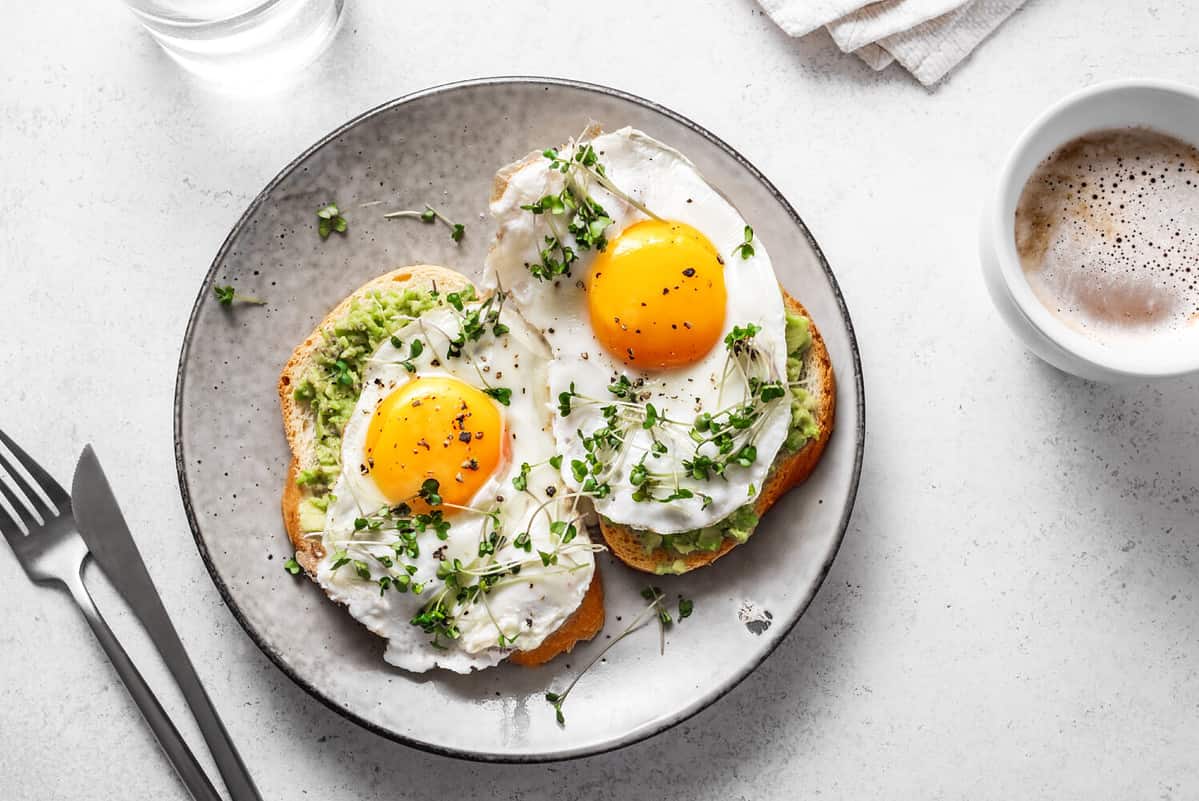
One common way to cook an egg is by frying it sunny-side-up.
©Oksana Mizina/Shutterstock.com
Because both of these eggs are similar in flavor and culinary uses in the kitchen, they can typically be prepared the same way. Here are a few quick ways you can prepare tasty eggs, regardless of whether they're quail or chicken:
Boiled
Quail eggs are often boiled and served as a bite-sized snack. They require less cooking time compared to chicken eggs due to their smaller size, but either boiled egg is perfect as an addition to salads and sandwiches, or as a stand-alone snack.
Poached
Poached eggs are gently cooked in simmering water and are often served on toast, in eggs Benedict, or as a complement to salads and grain bowls. Quail eggs are popular poached and then served on top of toast, in soups, or alongside other dishes.
Fried
Fried quail or chicken eggs, whether sunny-side-up, over-easy, or over-hard, are a classic preparation method. They can be enjoyed on their own, used as a topping for various dishes, or as the star ingredient in breakfast sandwiches.
Scrambled
A popular breakfast food, whisked quail eggs can be scrambled just like chicken eggs. They cook quickly, making them perfect for a speedy breakfast or a protein-rich addition to stir-fries and other savory dishes.
Baked
While chicken eggs are frequently used in baking recipes like cakes, cookies, quiches, and custards, quail eggs are often baked in muffin tins or ramekins. Because of their small size, baked quail eggs are popular for creating individual-sized egg dishes with an elegant presentation.
Egg Recipes
Print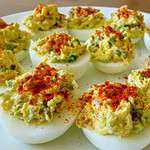
Easy Deviled Eggs
Ingredients
3 large hard cooked eggs
2 Tablespoons mayonnaise
1/2 teaspoon prepared mustard
1/8 teaspoon pepper
1/8 teaspoon paprika
Instructions
- Cut eggs lengthwise into halves. Slip out yolks and mash with a fork.
- Mix together the mayonnaise, mustard, and pepper. Add to the mashed egg yolks.
- Fill eggs with the yolk mixture, mounding slightly. Chill for 1 hour before serving.
Final Thoughts
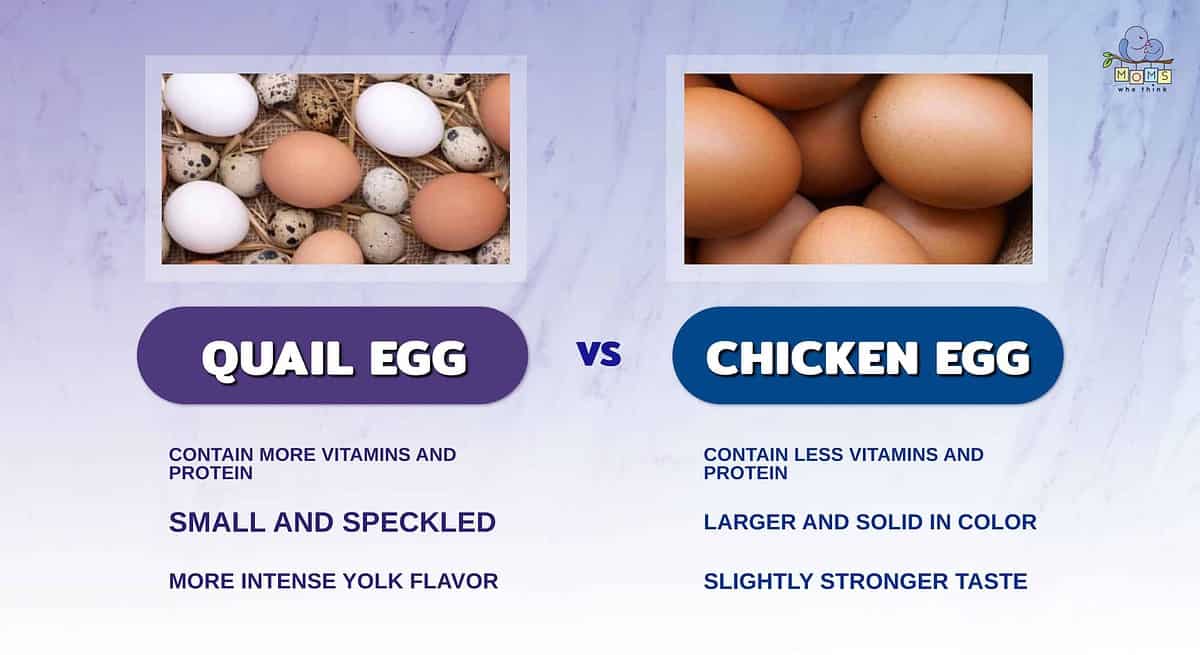
- Quail eggs are notably smaller than chicken eggs, with speckles all over them. This makes them easy to tell apart from their larger counterparts.
- While chicken eggs have a stronger overall taste, quail eggs have a more prominent yolk taste. This will likely play a large part in your decision between the two egg types.
- Quail eggs pack the nutrients on, making them a better choice than chicken eggs for those prioritizing their health.
While chicken eggs may be the go-to choice for most people, it's worth considering the use of quail eggs in your next culinary adventure. Quail eggs boast several advantages, particularly in terms of nutrition, while chicken eggs are more versatile and affordable. Whether you opt for the rich flavor and nutritional punch of quail eggs or the convenience and versatility of chicken eggs, both can contribute to a delicious side dish or meal. Which will you choose in your next recipe?
- The must-have convenient reference guide for every home cook!
- Includes more than 8,000 substitutions for ingredients, cookware, and techniques.
- Save time and money on by avoiding trips to grab that "missing" ingredient you don't really need.
The image featured at the top of this post is ©photka/Shutterstock.com
